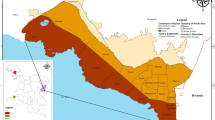Abstract
Unplanned and rapid growth of urban areas of developing countries poses major threat to service providers. Water supply management becomes critical aspect in the above scenario. The onus of managing its supply and distribution rests on the local government of the concerned area. Ahmedabad being world’s third largest and India’s fastest growing city has been selected for analysis of water supply services. Performance evaluation of water supply services for Ahmedabad city was carried out using nine performance indicators suggested by Ministry of Urban Development (MOUD), Government of India. The nine performance indicators as suggested by MOUD are: coverage of water supply connection, per capita supply of water, extent of metering of water connections, extent of non revenue water, continuity of water supply, quality of water supplied, efficiency in redressal of customer complaints, cost recovery of water supply services and efficiency in collection of water supplied related charges. Required data was collected from Ahmedabad Municipal Corporation. Analysis of the data suggests that among all the indicators of supply of water, cost recovery in water supply services, efficiency in redressal of customer complaints, quality of water supplied and efficiency in collection of water supply related charges showed good performance. However, metering of connection, continuity of water supply and non revenue water needs planned efforts to bring them up to the benchmark.
Similar content being viewed by others
References
Amiraly, A. and Kanniganti, K. (2011). “The impact of a pilot water metering project in an Indian city on user’s perception of the public water supply.” The Journal of Field Actions, Field Actions Science Report, Vol. 5, pp. 1–9.
Cheng, C. T., Wang, W. C., Xu, D. M., and Chau, K. W. (2008). “Optimizing hydropower reservoir operation using hybrid genetic algorithm and chaos.” Water Resources Management, Vol. 22, No. 8, pp. 895–909.
Cuimei, Li, Suiqing, Liu, and Kunlun, Xi. (2006). “Water distribution system evaluating method based on value engineering: Case study.” 8 th Annual Water Distribution Systems Analysis Symposium, Cincinnati, Ohio, USA.
David, M. and Isha, R. (2009). “Urban water supply in India: Status, reform options and possible lessons.” Water Plolicy, Vol. 11, No. 4, pp. 442–460.
Hand Book on Service Level Benchmarking (2008). Ministry of Urban Development, Government of India, New Delhi.
Hickey, H. E. (2008). Water supply system and evaluation methods, Society of Fire Protection Engineers (SFPE), Vol. 1, USA.
Jain, S. K., Sharma, A., and Kumar, R. (2004). “Fresh water and its management in India.” Journal of River Basin Management, Vol. 2, No. 4, pp. 259–270.
Manual on Water Supply and Treatment (1999). Manual on Water Supply and Treatment, Central Public Health and Environmental Engineering Organization, Ministry of Urban Development, Government of India, New Delhi.
Okeola, O. G. and Sule, B. F. (2012). “The evaluation of management alternatives for urban water supply system using multi criteria decision analysis.” Journal of King Saud University, Vol. 24, pp. 19–24.
Paul, P. and Ambujam, N. K. (2011). “Failure analysis and Simulation based performance evaluation of water distribution system.” European Journal of Scientific Research, Vol. 53, No. 3, pp. 369–384.
Popawala, R. and Shahm N. C. (2011). “Evaluation of Sustainability index for urban water management system.” 2 nd International Conference on Environmental Science and Development, IPCBEE, IACSIT Press, Singapore, Vol. 4, pp. 267–270.
Popawala, R. and Shah, N. C. (2012). “Sustainable urban water management systems: A review of status with focus on Surat city of Gujarat state in India.” Journal of Indian Water Works Association, Vol. XXXXIV, No. 3, pp. 185–193.
Raghunath, H. M. (2003). Ground water, New Age International (P) Ltd, New Delhi, pp. 1–2.
The 2007 Benchmarking and Data Book of Water Utilities in India (2007). A partnership between Ministry of Urban Development Government of India and Asian Development bank, Energy, Transport and Water, Asian Development Bank, Part. I, pp. 1–10.
World Bank (2006). “Delhi water supply and sewerage project.” Project Information Document Concept Stage, pp. 1–4.
Zerah, M. H. (2000). Unreliable supply in Delhi, Manohar Publishers & Distributors, New Delhi.
Zhao, M. Y., Cheng, C. T., Chau, K. W., and Li, G. (2006). “Multiple criteria data envelopment analysis for full ranking units associated to environment impact assessment.” International Journal of Environment and Pollution, Vol. 28, Nos. 3–4, pp. 448–464.
Author information
Authors and Affiliations
Corresponding author
Rights and permissions
About this article
Cite this article
Yadav, S.M., Singh, N.P., Shah, K.A. et al. Performance evaluation of water supply services in developing country: A case study of Ahmedabad city. KSCE J Civ Eng 18, 1984–1990 (2014). https://doi.org/10.1007/s12205-014-0306-8
Received:
Revised:
Accepted:
Published:
Issue Date:
DOI: https://doi.org/10.1007/s12205-014-0306-8




